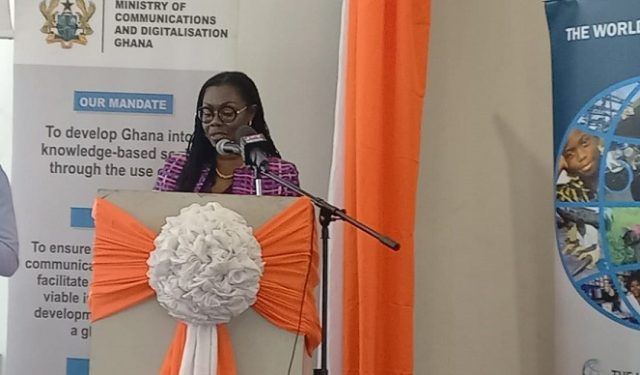The Communications and Digitalisation Minister and Ablekuma West Constituency lawmaker, Mrs. Ursula Owusu Ekuful has stated that, the importance in providing digital access to the physically challenged, in addition to the interventions that can be implemented, gaps in digital accessibility, and solutions to strengthen policy directives for Persons with Disability is unmatched.
This she said has pushed government to commence a Ghana Digital Acceleration Project from 2023 with support from the World Bank.
“I happen to be a member of the Disability caucus in Parliament so I’m an advocate for inclusion and I’m delighted that we are on the brink of taking concrete steps to address an age old problem using technology. We are here to discuss the importance of digital accessibility to the physically challenged, interventions that can be implemented, gaps in digital accessibility, and solutions to strengthen policy directives in this regard. It is timely as it is geared towards formulating strategies and interventions to facilitate digital inclusion for PWDs. I believe digital tools provide the means for providing dignified sustainable jobs for all, and present an excellent opportunity to provide job ready digital skills for all and reduce unemployment, solving multiple problems for us all. Whether you are vision, hearing, speech, developmental or mobility impaired or suffer from any other disability, there is digital technology available to provide you with a decent quality of life. Disability is not Inability” she made this known at a workshop on Digital Accessibility for Persons With Disability (PWDs) at the Kofi Annan Centre of Excellence In ICT (AITI-KACE).
She added, “I commend the National Council on Persons with Disabilities for partnering the MoCD and providing proposals to accelerate the inclusion of people with disabilities, which have been included in the Ghana Digital Acceleration Project which will be implemented in 2023 with the generous support of the World Bank.
We are working assiduously to promote digital inclusion as we are keenly aware of the benefits it provides to both the individual and the entire country. We will ensure that all citizens benefit equally and equitably from digital skills, products, and services as we are determined to narrow all forms of the digital divide. We are actively working to narrow the gender digital divide and I think women living with disability suffer a double this project provides us an opportunity.”
On his part, The World Bank’s country director for Ghana, Liberia, and Sierra Leone, Mr. Pierre Laporte, stated that the global development and poverty reduction agenda can only be met when the full potential of everyone, including people with disabilities, is explored.
According to him, digital skills are required for everyone to participate in various aspects of life. However, there is a digital divide that affects people with disabilities of all ages, as well as the elderly.
He, therefore called for collective efforts from the Government, International Organizations like the World Bank, and also from the private sector to strengthen systems and opportunities that will enable persons with Disability in Ghana to live a productive and self-fulfilling life.
Executive Secretary of the National Council on Persons with Disabilities (NCPD), Ms. Esther Akua Gyamfi on her part enumerated that members of the 26 categories of PWDs face several issues that hinder their access to employment.
She said lack of digital skills results in their inability to access government portals which marginalizes them and prevents them from accessing information online.
She suggests enhancing access to affordable ICT services and providing a framework for making online content assessable to PWDs.


Comments are closed.